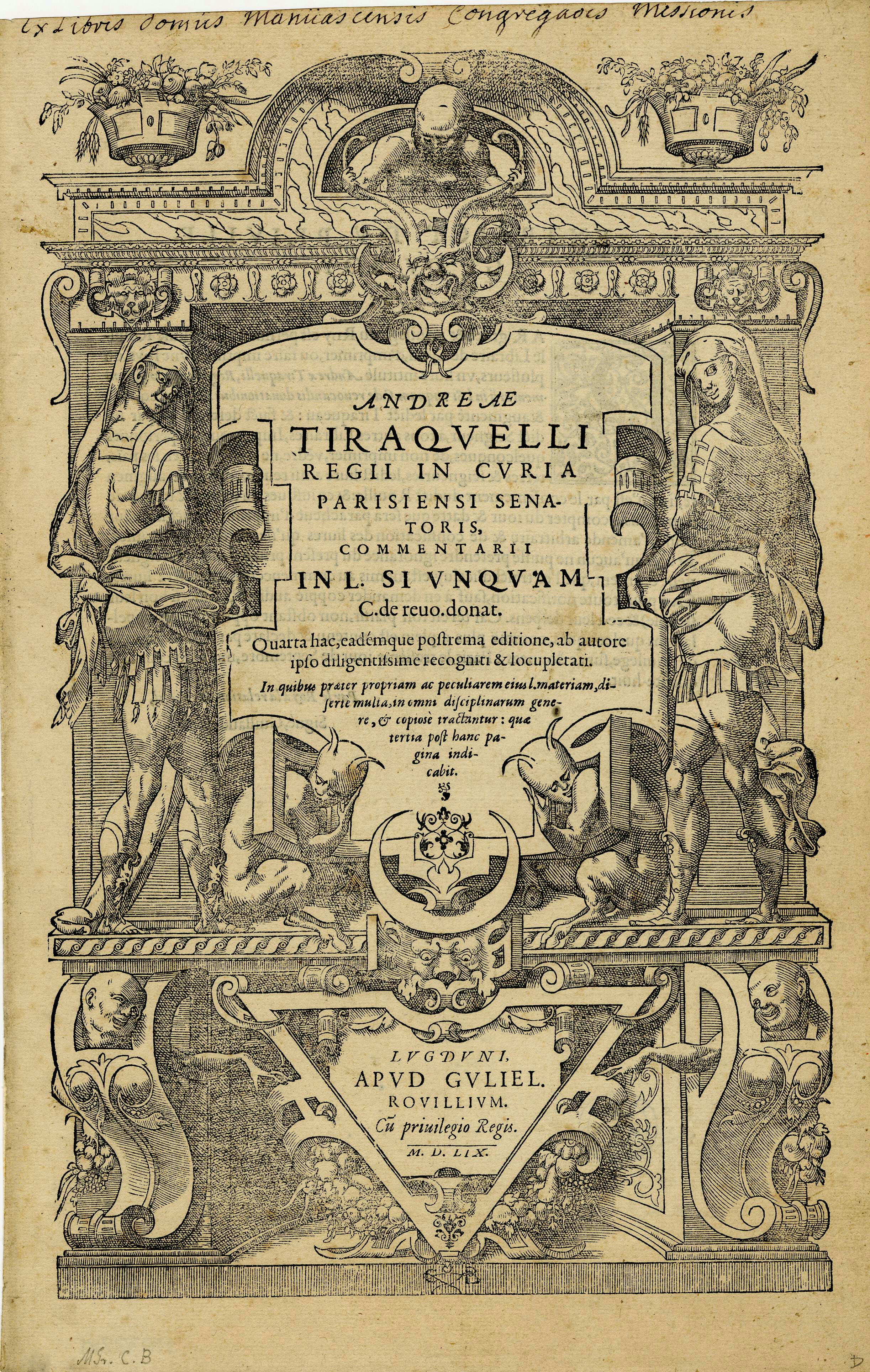André Tiraqueau on:
[Wikipedia]
[Google]
[Amazon]
André Tiraqueau () (1488–1558) was a French jurist and politician. He is known also as a patron of François Rabelais, and the character Trinquamelle in '' Gargantua and Pantagruel'' is traditionally identified with Tiraqueau.Edwin M. Duval, ''The Design of Rabelais's Tiers livre de Pantagruel'', p. 136
Google Books

 *''De nobilitate et jure primigeniorum'' (1549). This work addressed the topic of
*''De nobilitate et jure primigeniorum'' (1549). This work addressed the topic of
Google Books
WorldCat pageOpen Library page
{{DEFAULTSORT:Tiraqueau, Andre 1488 births 1558 deaths 16th-century French lawyers French Renaissance humanists French male non-fiction writers
Google Books

Life
He was a legal humanist based in Fontenay-le-Comte, Poitou, where he knew Amaury Bouchard. He married Marie Cailler, daughter of Artus Caillier, a legal officer at Fontenay; the marriage took place in 1512, when she was still very young, and he proceeded with two works on the '' Querelle des femmes'' and married life. Tiraqueau held the local legal offices of ''juge-châtelain'' and ''lieutenant''. He was appointed a counsellor of the Parlement of Paris in 1531. Pierre Bayle included a chapter on "Books and Children" in his ''Historical and Critical Dictionary'' calling into question a claim that Tiraqueau fathered 45 children and wrote as many books, creating one of each per year.Works
Tiraqueau had a reputation as a prolific writer. *''De legibus connubialibus'' (1513). This work justifies the legal disabilities of women by appeal to '' jus gentium'' and divine law. It began as part of a commentary on the customs of Poitou, and grew through numerous editions. *''De nobilitate et jure primigeniorum'' (1549). This work addressed the topic of
*''De nobilitate et jure primigeniorum'' (1549). This work addressed the topic of nobility
Nobility is a social class found in many societies that have an aristocracy. It is normally appointed by and ranked immediately below royalty. Nobility has often been an estate of the realm with many exclusive functions and characteristics. T ...
as social status and recognition, picking up from Bartolus who wrote a work with the same title. Tiraqueau's theory followed that of Bartolus, on the political and legal origins of nobility, as opposed to kinship; and integrated it with the French situation and the '' scientia juris''. The theory was undermined in the longer term by the French kings' use of venal office.
He wrote a commentary on the ''Geniales dies'' of Alessandro Alessandri.
Tiraqueau's works were collected, firstly in five volumes (1574), and then in seven (Frankfurt, from 1597). The arrangement in the seven-volume edition is:
*I: On nobility and primogeniture
Primogeniture () is the right, by law or custom, of the firstborn Legitimacy (family law), legitimate child to inheritance, inherit all or most of their parent's estate (law), estate in preference to shared inheritance among all or some childre ...
;
*II: legal rights in marriage;
*III: law of repossession;
*IV: ''Cessante causa'';
*V: Legacies for pious use, and other works;
*VI: Commentary on ''Si unquam'';
*VII: moderation of punishments.
Friendship with Rabelais
Rabelais met Tiraqueau during his time as an Observantine Franciscan at Fontenay; he participated in the humanist circle there, in the early 1520s. Tiraqueau was the dedicatee of an edition by Rabelais of the letters of Giovanni Manardi. As Rabelais was writing his ''Tiers Livre'', Tiraqueau was collecting authorities for his work on nobility (1549). It has been suggested that Rabelais took largely from Tiraqueau's references. Tiraqueau apparently cooled towards Rabelais in later life, and played down his public disagreement with Amaury Bouchard over women (of which Rabelais made much literary use).Plattard, p. 249Google Books
Notes
References
*Jean Plattard (1968), ''The Life of François Rabelais'' * M. A. Screech (1979), ''Rabelais''External links
WorldCat page
{{DEFAULTSORT:Tiraqueau, Andre 1488 births 1558 deaths 16th-century French lawyers French Renaissance humanists French male non-fiction writers